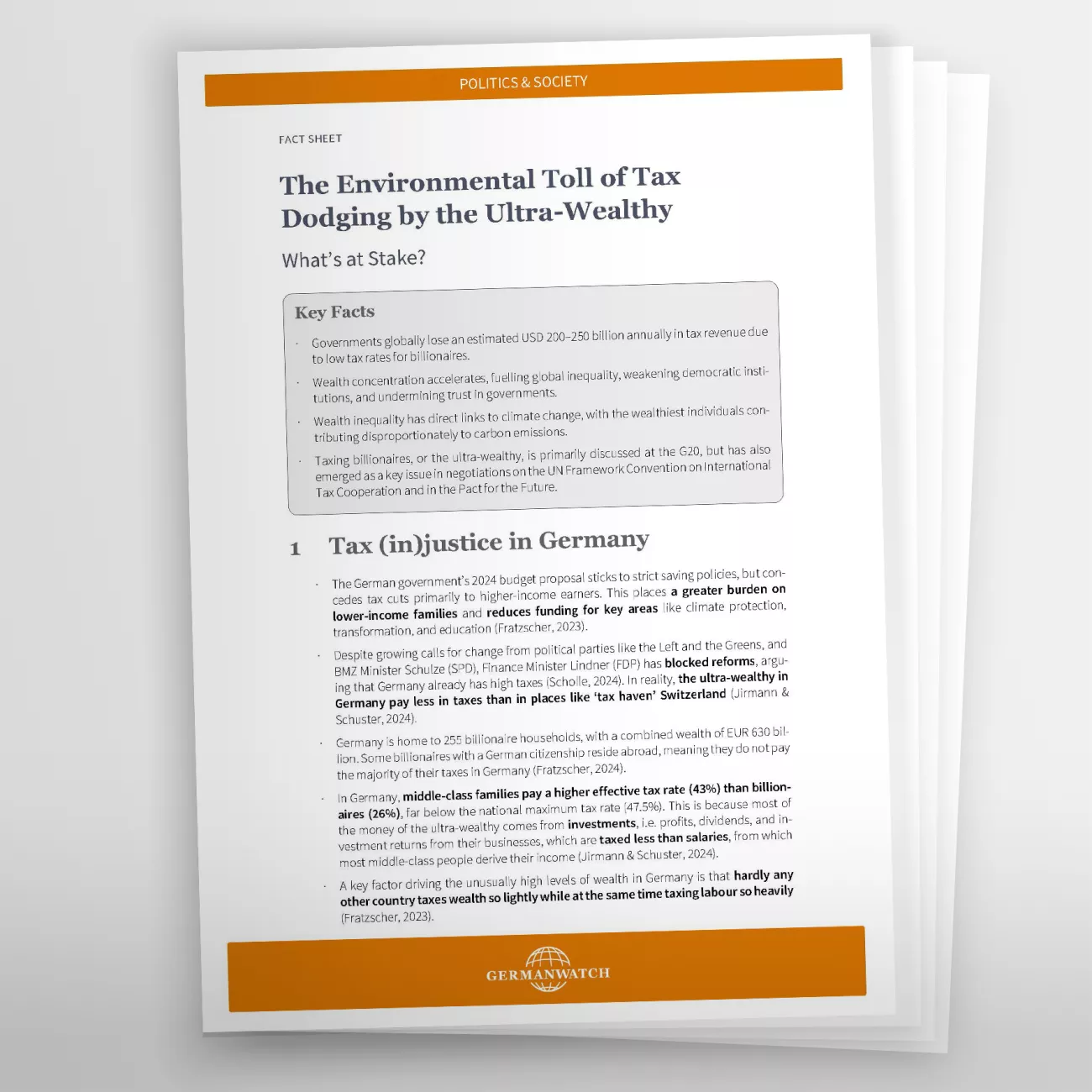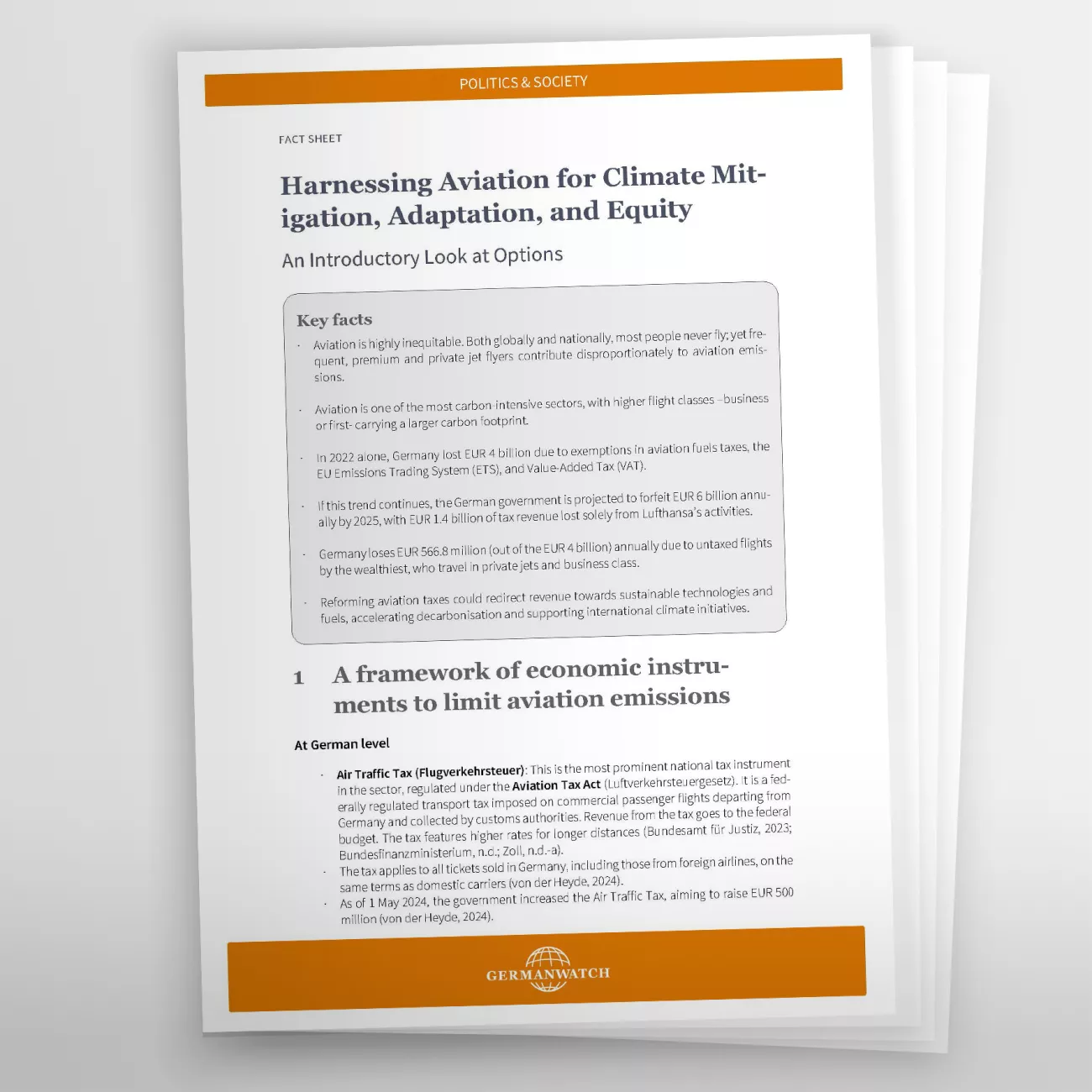As the world grapples with an accelerating climate crisis, unchecked emissions and extreme wealth concentration are compounding climate inequality. Aviation emissions—particularly from private jets, which serve the ultra-wealthy—and vast, largely untaxed fortunes accumulated by billionaires impose an outsized toll on our planet, while largely escaping accountability.
Two Sides of the Same Coin: Wealth Inequality and the Environmental Crisis.
In Germany, over 255 billionaire households collectively hold a staggering wealth of approximately EUR 630 billion.
While most recognize that tax systems often fail to effectively tax these billionaires due to their sophisticated financial maneuvers and loopholes, fewer see how this concentration of wealth exacerbates the environmental crisis. The ultra-wealthy contribute disproportionately to carbon emissions, fueling climate change through their lifestyles and investments in polluting industries.
The wealthiest 1% in Germany emit 15 times more carbon than the poorest half. Globally, the disparity is even starker: the top 0.01% emit 2,300 tons of CO₂ per person annually compared to 1.4 tons by the bottom 50%.
While the ultra-wealthy emit the most carbon, poorer populations bear the brunt of climate impacts —experiencing harsher droughts, extreme weather events, and environmental degradation.
A 2% tax on the wealth of Germany's billionaires could bring in around EUR 5.7 billion annually, with nearly EUR 16.9 billion more if applied to centi-millionaires as well. While this amount is a small portion of Germany’s EUR 450 billion federal budget, it could significantly help bridge budget shortfalls and support crucial public investments in health, education, and climate.
The High Cost of Privilege: Private Jet and Premium Air Travel Emissions.
Flying may be recognized as a significant contributor to carbon emissions, but the true environmental cost skyrockets with the affluence of those who fly. Yet, private jets and luxurious business-class tickets largely go untaxed, creating a glaring gap in environmental accountability.
Private jets are not mere luxury items; they represent one of the most carbon-intensive modes of travel, with emissions per passenger soaring 5–14 times higher than commercial flights. Germany alone accounts for nearly 10% of Europe’s private jet emissions, with the ultra-wealthy contributing disproportionately.
The average net worth of private jet users stands at a staggering EUR 1.3 billion, making them largely immune to any financial repercussions from rising flight costs. If private jets were taxed based on their climate impact, the country could generate an additional EUR 263.8 million annually, making a significant contribution to climate action.
Meanwhile, business and first-class passengers also impose a hefty carbon footprint, often going unrecognized in current tax structures. The class of travel is a major determinant of a flight’s carbon footprint.
Business- and first-class passengers are estimated to contribute disproportionately to CO₂ emissions at a rate of 3.7 times more on short-haul flights and 4.3 times more on long-haul flights. A differentiated tax on premium travelers could raise EUR 303 million each year, affecting only 8% of passengers
Untaxed flights by affluent individuals thus result in an annual loss of EUR 566.8 million for Germany.
This stark reality highlights the urgent need for reform in aviation taxation; it’s not just about reducing emissions—it's about ensuring that those who can afford to fly in luxury contribute their fair share to combat the climate crisis.
Publications
Unchecked aviation emissions and the growing concentration of billionaire wealth are dual challenges in our fight for climate justice. Our factsheets spotlight how the absence of fair taxes on private jets and billionaire wealth enables a disproportionate environmental impact and leaves essential climate initiatives underfunded. With effective taxation on ultra-wealthy individuals and private aviation, we can redirect critical funds toward sustainable projects, reduce emissions, and create a fairer path to climate resilience.
Factsheet 1: The Environmental Toll of Tax Dodging by the Ultra-Wealthy: What’s at Stake?

Discover how Germany’s ultra-wealthy pay far less in taxes than middle-class families and how this imbalance fuels carbon emissions and environmental harm. Our latest factsheet uncovers billionaires’ tax avoidance strategies, the environmental toll of their wealth accumulation, and an international proposal for a billionaires tax to advance social and climate justice. Dive in to learn what’s at stake and how fairer taxation can drive sustainable change.
Factsheet 2: Harnessing Aviation for Climate Mitigation, Adaptation, and Equity: An Introductory Look at Options

This factsheet explores the role of aviation in climate action, highlighting both the gaps and opportunities in how flights are taxed and regulated. By examining current policies and proposing targeted reforms—such as fairer air travel taxes and addressing private jet emissions—it reveals how strategic changes could advance environmental accountability, fund sustainable fuels, and foster climate equity. Discover how these solutions could propel Germany and the EU toward more sustainable skies.


